
More than a year has passed since the coronavirus pandemic began, and it feels like the last leg of a brutal workout. The end is in sight, but there are only so many more reps you can complete until you hit a wall.
After months spent quarantining, working from home, isolating from loved ones and digesting endless news articles, pandemic fatigue — aka feeling burned out and totally through with pandemic life — is practically inevitable.
Video of the Day
Video of the Day
So, what can you do? According to a February 2021 Global Wellbeing Report by lululemon that spanned 10 countries, the people coping best during this time are those focused on a few simple aspects of wellbeing: healthy eating, sleep, exercise, connecting with loved ones and spending time outdoors.
But giving 100 percent of yourself to those priorities can seem daunting. Now more than ever, it's the small wins that count.
Instead of diving into a wellness routine full throttle (and potentially burning yourself out), focus on these seven simple wins to feel better.
Get tips on how to stay healthy, safe and sane during the novel coronavirus pandemic.
1.Schedule Intentional Breaks
You don't need to devote hours to wellness each day (though you certainly can). If you're short on time, Chicago-based clinical psychologist Aimee Daramus, PsyD recommends you schedule a few five-minute breaks during the day.
"Spend that few minutes fully immersing yourself in something you can enjoy with multiple senses," Daramus recommends. "Notice color, texture, any sounds — everything. Do this every day to make the most of your breaks."
You can try knitting, playing with your pet or eating your favorite snack. Whatever you do, make sure to put these breaks on your calendar so you actually take them.
2. Add a Bright Color to Your Favorite Meal

Instead of focusing solely on the nutritional value of the foods you eat, add a bright-colored fruit or vegetable to your favorite meal of the day, suggests Frances Largeman-Roth, RDN, registered dietitian and author of Smoothies & Juices: Prevention Healing Kitchen.
"That might mean sliced strawberries on your oatmeal at breakfast, and mango cubes in your yogurt," Largeman-Roth says. "Not only do the colors have an uplifting effect on your mood, they also help boost health with the phytonutrients they contain."
3. Go for a Walk
There's no specific amount of steps you need to hit each day — nope, 10,000 steps isn't the magic number. Instead, set a totally personal goal.
And on days you don't want to run through an official workout, hitting your personal goal is an excellent fitness accomplishment, especially if the weather is nice, according to New York-based certified personal trainer Maillard Howell, CPT.
"Outdoor movement especially in the sun helps me greatly," Howell says. "[Hitting a step goal] gives me another simple challenge to get through that one day. I use this especially on days I don't feel like working out, which come frequently in the pandemic."
Yep, you read that right: Even personal trainers experience pandemic-related exercise fatigue.
4. Break Up a Big Task

If you're feeling overwhelmed by a task, it probably means you're trying to do too much too quickly, Daramus says. Break up your big to-do into a bunch of mini tasks and then re-analyze your list. Keep breaking down each task until it feels small enough to manage — even if that means pushing something back a bit.
And that doesn't apply only to your work life, she says. If you can't face a 30-minute workout, start with just five minutes, take a break and work on other things. Then come back to your workout for another five.
When the thought of putting together a huge dinner feels daunting, split up elements across the day. Chop ingredients in the morning, prepare sauces in the afternoon and put everything together in the evening.
Related Reading
5. Hit Your Carb Quota
It doesn't get said enough: You don't need to cut carbs!
Quite the contrary, you want to fill your meals with plenty of nutritious carbs to feel energized and satiated, according to dietitian and certified personal trainer Jim White, RDN, CPT.
But picking the right kind of carb is crucial, White says. Whole-food carbs like sweet potatoes, pumpkin or butternut squash are loaded with plenty of vitamins and nutrients. Similarly, whole grains like brown rice or whole-grain pasta will pack plenty of fiber and minerals.
"During the pandemic, people have been experiencing low energy due to stress. The main purpose of carbohydrates is to give us energy," he says. "This is why I recommend having a healthy carbohydrate option for each major meal."
Want to hit your carb quota? Try White's recommended menu:
- Breakfast: High-protein waffle with some fresh fruit — bonus for colorful fruit (see above)
- Lunch: Chicken sandwich on whole-grain bread with a side salad
- Dinner: Whole-grain pasta with lean turkey meatballs
6. Touch on Your Core Values

One way to feel better when you're stressed or feeling burned out is to reconnect to some of your core values, Daramus says. And while spending time on these is always a good thing, you don't need to devote hours to reflection each day.
Instead, make this a quick daily or weekly practice. Spend a few minutes journaling about good deeds you may want to accomplish that day or week, she suggests. Or spend some time reading through inspirational quotes or poetry.
"Do this at least once a week to remind yourself that there's deeper meaning to what you do," she says.
You can even build this practice into one of your scheduled daily breaks if that feels good to you.
7. Try a Mindfulness App Before Bed
You're probably aware that staring at your phone before bed isn't the best recipe for a night of good sleep. But tossing on headphones and listening to a mindfulness app or podcast isn't off limits.
"[Using a mindfulness app] helps me wind down at the end of the day mentally," Howell says. "I use it three to five minutes before I go to bed. I find that I am able to fall asleep much easier as a result. Better sleep, better performance."
If apps aren't your thing, listening to calming music is another way you can unwind and mentally prepare for sleep.
Related Reading
Is this an emergency? If you are experiencing serious medical symptoms, please see the National Library of Medicine’s list of signs you need emergency medical attention or call 911.